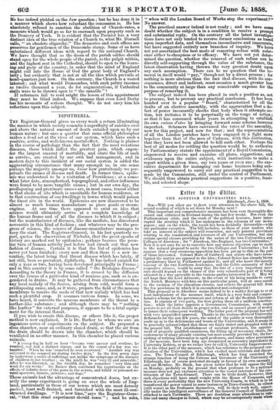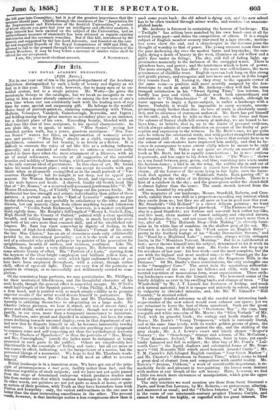Itttn to t4t fifitor.
THE SCOTTISH UNIVERSITIES BILL.
Edinburgh, .Tune 1 1858. Sin—Will you allow me to firaw your attention to the above bill, the second reading of which is set dOwn for Monday. next ? This important and comprehensive measure has been very thoroughly dis- cussed and criticized in Scotland during the last few weeks. Not even the Parliamentary crisis, and the crash of the political heavens, have inter- rupted the scrutiny which it has undergone in the columns of our news- papers ; and on the whole, the result has been decidedly faVourable—with one particular exception. The bill includes, as those of your readers who take an interest in the subject will remember, not only general provisions relating to the constitution and interests of all our Universities, but also certain special clauses providing for the union of the two Universities and Colleges of Aberdeen ; for " Aberdeen, like England, has twoUniversities." Now it is not easy for us to conceive how any serious objection can be made to the natural proposal to unite the two Colleges and Universities ; but it appears that a very strenuous opposition has been of up to this on the part of those interested. Colonel Mnre of Caldwell and others who have inves- tigated the matter are opposed to the idea; Colonel Sykes has already blown a preliminary blast in Parliament against it; and all who know the sisterly rancour of the two Northern Academies, and the Celtic animosity of their respective alumni, would be sorry that the fate of a very important mea- sure should depend on the chance of this very subordinate part of it being adjusted in a way agreeable to the various parties interested in it. May we not hope that the Lord Advocate, in the event of his being unable to carry the Scotch Members with him on this particular point, will at once assent to the excision of the obnoxious clauses, and relieve the general bill from the few provisions by which it is encumbered and endangered ? This proposal as to Aberdeen seems indeed to be a matter foreign to or at least independent of the measure itself, which is a very bold and compre- hensive scheme for the government and reform of all the Scottish Universi- ties. It consists of two parts, the first giving them all a uniform constitu- tion ; while the latter appoints a Government Commis' aion, with ample powers to set all their details in proper order, and an annual grant of money to insure their subsequent working. The latter part of the proposal has met with very unqualified approval. Thanks to the zealous efforts of University Reformers for the last few years, the mind of the public is very thoroughly made up as to the deficiencies and wants of the Universities, and it seems to be generally acknowledged that these are fairly stated and grappled with in the present bill. The establishment of assistant professors, the appoint- ment of properly qualified examiners, the filling up of necessary, chairs, the endowment of many already existing but most scantily provided for, thefur- nishing of retiring allowances to aged professors, and many other provisions of the measure, have been long ago recognized as necessary ingredients is University Reform, or as we rather love to call it, University Improvement. It is the other part of the measure, which has reference to the proposed con- stitution of the universities, which has excited most criticism and discus- sion. The Town-Council of Edinburgh, which has long exercised the strange function of being the Patrons and Governors of the University of Edinburgh, has of course protested strongly in favour of its own anomaly' and our Member Mr. Black, has given notice that he will oppose the bin on Monday, probably on the ground that what professes to be a national measure does not pay exclusive attention to the vested interests of his con- stituents of the Town-Council. There can be little doubt, however, that such objections will have small weight with the House of Commons, and there is every probability that the new University Courts, to which is to be transferred the power vested in some instances in Town-Councils, in others (still worse) in the Professors themselves, will do their work well, especi- ally under the intelligent surveillance of 'the General Council of Graduates attached to each University. There are doubtless some alterations in out- line and many changes in detail, which may be advantageously made when the bill goes into Committee ; but it is of the greatest importance that the semen should pass. Chiefly through the exertions of the "Association for the Improvement and Extension of the Scottish Universities," a society of whose objects you gave last year an intelligent and effective analysis, a huge interest has been excited on the subject of the Universities, and an extraordinary measure of unanimity has been attained as regards existing deficiencies and the necessary remedies. But if this bill, introduced by the nt and supported by the late Lord Advocate, end founded on the care hand impartial Reports of the Royal Commissions of 1830 and 1835, is allowed to fall to the ground through the carelessness or crochettiness of the Scotch Members, it may be long before a measure of similar value shall be offered for our acceptance. I am, Sir, your most obedient servant, A SCOTCHMAN.



































 Previous page
Previous page